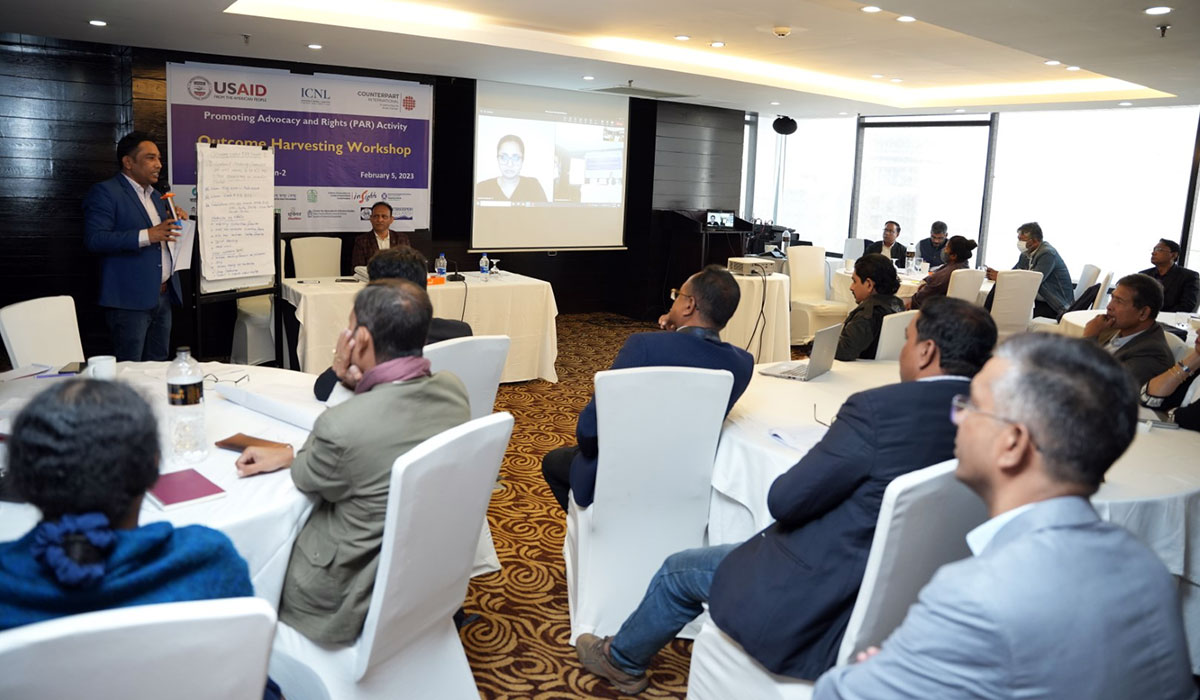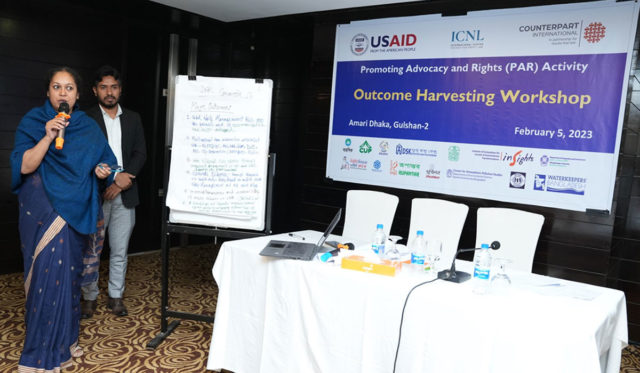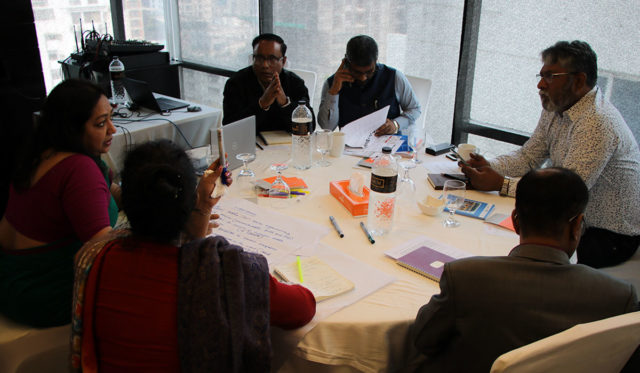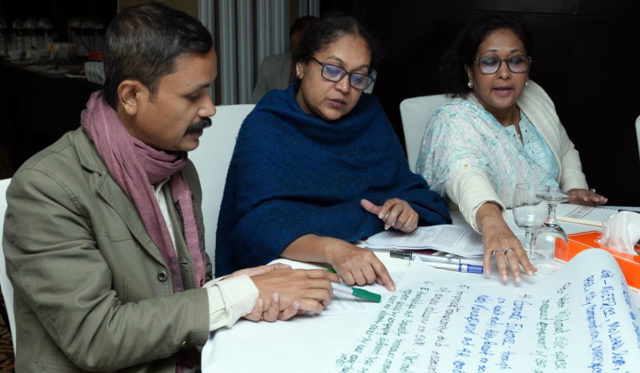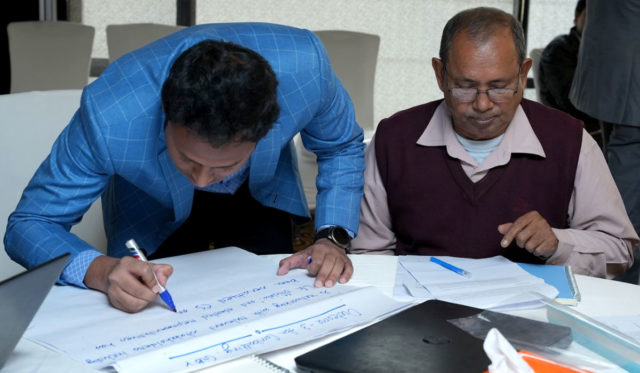Counterpart International convened an ‘Outcome Harvesting Workshop’ – first of its kind, on February 5, 2023, as almost all the activities have been completed according to the project plan and scope under the five year long USAID funded Promoting Advocacy and Rights (PAR) activity.
The aim of the exercise was to determine the outcomes of the program that have positively impacted the environment for civic participation both nationally and at a sub-national level.
The workshop employed open-ended questions to encourage sub-grantees to reflect on the results of the program, including both unforeseen outcomes and outcomes that may not directly align with the program’s objectives. A total number of 31 (7 women and 24 men) participants including seven government officials, PAR partner and sub-grantees attended in the day long program. The workshop was organized in hybrid method where PAR’s international consultant Deepti Sastry leads virtually in facilitating the whole workshop.
The objectives of the harvesting exercise were
- To harvest outcomes from partner and sub-grantees, which will assess the impact of the sub-grantee’s actions on civic participation and engagement between CSOs and government officials, how their efforts have influenced changes in civic space, the expression of citizens’ opinions, trust in government, the representation of diverse perspectives, and the empowerment of CSOs.
- To determine the impact of the PAR activity on the outcomes achieved. Through utilizing a set of questioners, the harvesting exercise will assess how it has impacted the changes in civic space.
- To identify what the programme can do next; the harvest will suggest whether PAR outcomes can be scaled, replicated, or altered in further activities.
After welcoming all the participants, Mainuddin Ahmed, CoP, Counterpart International opened the harvesting exercise with a short briefing on the objectives. The consultant Deepti then took the floor (virtually) to provide guidance and create a “safe space” for a participatory workshop where everyone can feel free to share their ideas in order to harvest as many outcomes as possible.
In the first session of the day long program, the participants were divided into four breakout sessions to brainstorm on thematic harvest and to contextualise why each outcome is important when responding to the context/problem based on their PAR experiences.
The breakout sessions were designed based on participant criteria where DSK consortia was for solid waste management under environment pollution grant; Rupantar and Shushilan consortia were under gender-based violence and unplanned urbanization; GBSS, Dalit and YPSA were under social inclusion and online advocacy toolbox and lastly the Light House, WKB consortia and ICNL covered drug abuse, environment pollution, enabling legal space for CSOs.
After the breakout session, each group presented their organisation’s outcomes considering i. which actors they hope to influence, ii. what these actors are now doing differently, and iii. why they think this change has emerged. After each outcome has been presented, other group participants asked questions to validate and strengthen the claim that was made. During the presentation each of the groups also reflected on who else they might consider working with and what other types of activities they might implement.
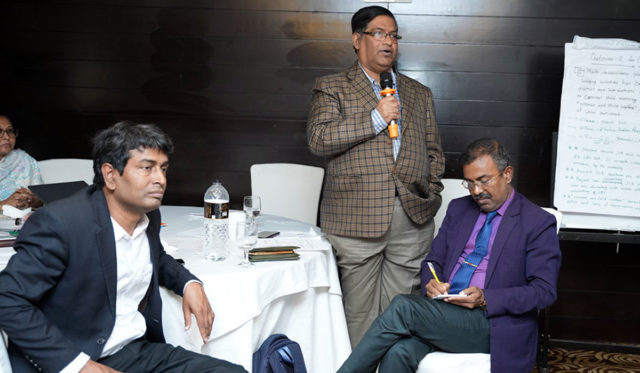
The second half session was attended by the seven government officials came from Khulna and Dhaka in addition to PAR partner and sub-grantees. From Khulna Kazi Md. Sabirul Alam, Chief Engineer, Khulna Development Authority (KDA); Md Rezaul Islam, Executive Engineer, Khulna Water Supply & Sewerage Authority (KWASA); Shaikh Mohammad Ali, Councillor, Ward 5, KCC; Md Mahfuzur Rahman Councillor, Ward 9, KCC and from Dhaka Md Anowar Hossain Bhuiyan, Assistant Social Welfare Officer, Dhaka North City Corporation (DNCC), Zone-02; Mr. Naimul Azam Khan, Deputy Secretary and Personal Secretary to Chairman of Standing Committee for Ministry of Environment, Forest and Climate Change (MoEF&CC); Mr. Babar Ali Mir, Zonal Executive Officer (Deputy Secretary), Dhaka South City Corporation (DSCC), Zone-03 were among the participants.
A session focused on successful engagements and relationships that PAR helped forge between government officials and civil society organizations. It was an important public display of constructive collaboration where CSOs, even as staunch advocates for government’s responsiveness, can still develop good working relationships for the betterment of the people of Bangladesh.
As the day was wrapping up, several recommendations were made by the participants (both GO and NGO officials) as way forward on how to strengthen the relationship between CSOs and government stakeholders.
Habiba Akter, Acting Deputy Office Director, and Sumana Binte Masud, Project Management Specialist/Civil Society Advisor, DRG, USAID/Bangladesh attended the workshop.

